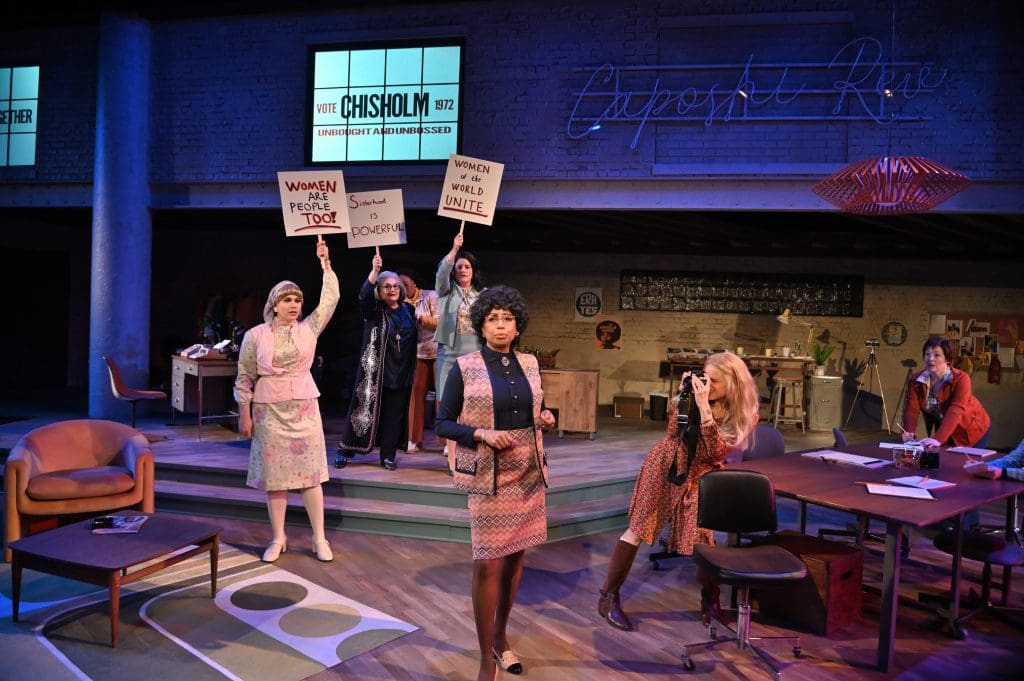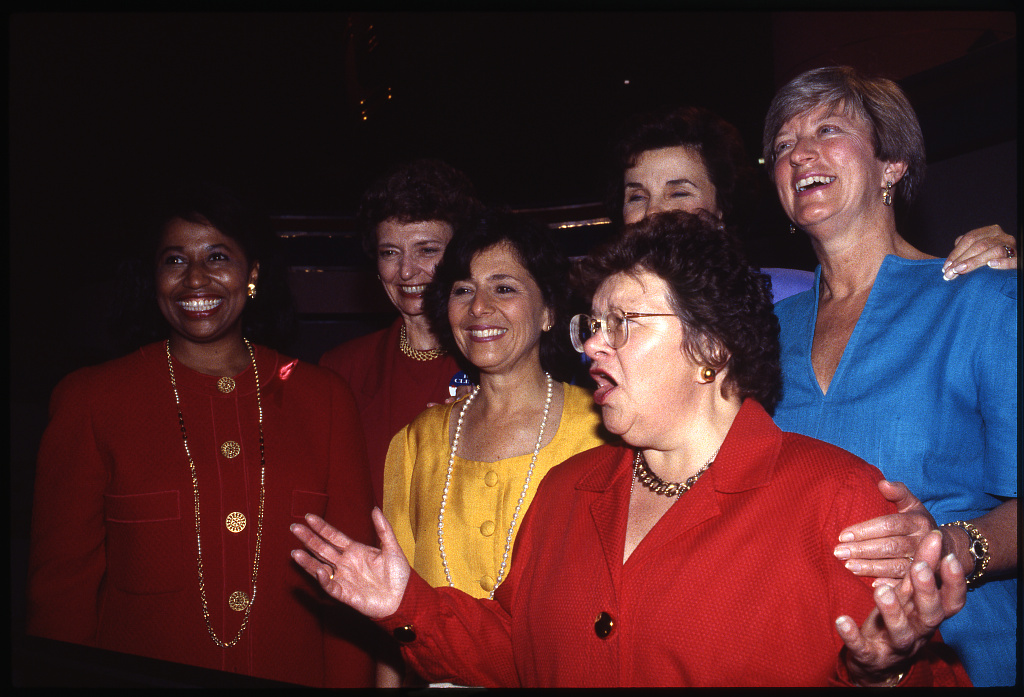by Jules Odendahl-James, dramaturg for The Inferior Sex
Politicians are part of the cultural and economic elite. Their choices are always about public perception. In that context, a dress is never just a dress. It is always strategy.
— Sociologist Tressie McMillan Cottom (UNC-Chapel Hill), “Why We Should Talk About What Kyrsten Sinema Is Wearing,” The New York Times Oct. 29, 2021.
In 1993, a dinner honoring the memory and achievements of Jane Addams at Hull House in Chicago was televised. Wilma Mankiller, the first woman to lead the Cherokee Nation (1985-1995), spoke of the revolution needed before women could be elected to political leadership.
Without foundational shifts in understanding how gender and gendered roles influenced the enactment of power, women who gained political access might quickly forget their solidarity with other women, and cloak themselves in privilege.
Mankiller mentioned recently elected white women by name, and how they had abandoned “Black and Brown women, Native women, and poor women.”
Powerful narratives never go out of style. Nearly 20 years later I saw this footage again when it appeared on YouTube, marking Mankiller’s death in 2010. It reminded me of my own youthful joy at the election of 1992. Christened by media outlets as “The Year of the Woman,” 1992 was the year that voters sent four women to the United States Senate, the same body that had adjudicated the Clarence Thomas confirmation hearings in 1991. We also sent 47 women to the House of Representatives, which at the time was reeling from an internal banking scandal where members overdrew accounts without the risk of financial penalty.

Most recently, I caught the Hull House dinner clip in an Instagram Reel and felt a pang of recognition for the reality Mankiller diagnosed 50 years ago that remains true today. The 118th Congress boasts many women in seats of power now – 24 in the Senate and 125 in the House. However, national legislative gains for women (some barely 50 years old) are in peril. And yet, Missouri’s 2023 legislative session opened with a debate focused on nuances in the dress code for women congressional leaders, particularly the “proper” covering of arms and shoulders. A pressing issue for our times brought to the floor by a woman legislator.
One reason I have found such great joy in working as a dramaturg on the work of playwright Jacqueline Lawton is the way she injects spoonfuls of historical “medicine” into her work. In this case, the sugar of her workplace comedy, The Inferior Sex.
As a dramaturg, my mission is to not just ask, “Why is this story a play?” but “Why this play, for this theater, at this moment?” And finally, “What questions will audiences bring to this play and what questions should they take away?”
In five years, Lawton and I have collaborated on more than 10 plays, and every production sings of her pitch-perfect ear for how women talk with and about each other in private and public. The scripts showcase her keen intuition for how unsettled tensions surrounding race, gender, sexuality, and socio-economic class limit America’s vision of “a more perfect union” from coming to fruition.
Lawton excavates moments in history that we think we know, uncovering nuances experienced by Black women who must navigate life choices in a world of white women, the latter assuming a shared gender struggle without noticing key differences in effect. Her body of work centers Black women who rely upon humor, intelligence, and savvy to negotiate revolutions in thought, politics, and economics. This play brings us a bit closer to our current historical moment, inviting us to remember that the chaos of public and political life experienced after the election of 2016 was far from a once-in-a-lifetime moment.
In fact, 1972 burst at the seams with history-making events – from those surrounding the draft and protests against the war in Vietnam; to the Watergate burglary and re-election of Richard Nixon; to the passage of the Equal Rights Amendment and Title IX; and finally, the Supreme Court’s hearing arguments that would produce the next year’s decision on Roe vs. Wade.
1972 arrived two years before the Equal Credit Opportunity Act allowed U.S. women to have credit cards in their own names. It was the year that Shirley Chisholm – the first Black woman elected to the House of Representatives – made history by running for the Democratic nomination for President.
The Inferior Sex imagines a proto-Teen Vogue in the offices of Caposhi Rev. (Caposhi being slang for “cool,” with Rev standing for “revolution.”) Here gathers a group of creatives threading fashion and feminism through their experiences as working women, employed outside the homes in skilled and expert roles, collaborating on a product of their own creation. Or mostly their own creation. The editor-in-chief’s father owns the company behind the magazine. But Sandra built, and now drives this magazine. She employs friends, and women of her social circle whom she met at college (Smith, Vassar, Barnard). Her circle is exclusive and mostly excellent, but it lacks diversity on many levels.
When this in-crowd welcomes someone new who pushes them to answer questions they’d rather not have been asked, to notice incongruities they’d rather not have seen, and to risk the comforts they’d rather not go without to pay more than lip service to equality. This is when the plot thickens. Gwen joins at the behest of her friend Joan, another writer whose skills and insights the others have overlooked. But Gwen finds her greatest co-worker in Connie, Sandra’s family maid who also cleans the office, and the only other Black woman on the payroll.
Together, unbeknownst to their white colleagues, this pair works slowly and carefully to reshape the contours of the magazine to reflect the shape of the time as they know it. In their moves, we catch a glimpse of the world that Shirley Chisholm imagined, and how it was resisted.
“Unbought and unbossed,” was not just a fantastic political slogan, it was the animating tone of Chisholm’s speeches and policy proposals. It’s why there has not been another candidate like her to this day. Only when Vice President Harris was Presidential candidate Harris, did Chisholm’s name find its way back into the news with many younger women wondering why they hadn’t heard of her before?
Caposhi Rev is not only a world of high fashion, filled with the expected foibles of materialism and excess. It’s a world where characters chip away at outmoded notions of decorum and life aspirations for women; a world where we relearn lessons from history, crystallized into stories of multi-dimensional people who might have lived them. Perhaps you recognize yourself in one of these characters. If so, let Chisholm’s unforgettable 1974 address, at the University of Missouri, Kansas City, “The Black Woman in Contemporary America” be your guide:
It is very interesting to note that everyone – with the exception of the black woman herself – has been interpreting the black woman. […] I would never have been able to make it in America if I had paid attention to all of the doomsday-criers about me. [… So] put the cards out on the table and do not be afraid to discuss issues that perhaps you have been sweeping under the rug because of what people might say about you. You must remember that once we are able to face the truth, the truth shall set all of us free.
Photo: [Senator Barbara Mikulski standing with women senatorial candidates (left to right) Carol Moseley-Braun, Barbara Boxer, Senator Patty Murray and others at 1992 Democratic National Convention, Madison Square Garden, New York City]
